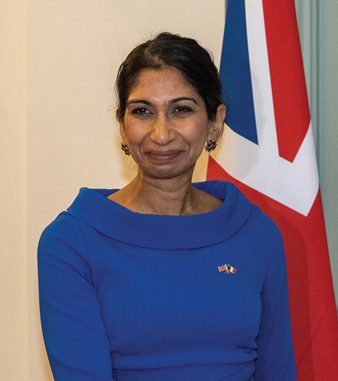After a visit to the Counter-Terrorism Operations Centre (CTOC) in London, Home Secretary Suella Braverman, pictured, launched the UK’s updated counter-terrorism strategy, CONTEST 2023, at Central Hall in Westminster on July 18.
The last formal update of CONTEST was five years ago, she said. “Since then, we have seen nine declared attacks and 39 disrupted attacks. The terrorist threat is enduring. While Islamist terrorism remains the predominant threat, the key point today is that terrorist attacks are becoming increasingly unpredictable, making them harder to detect and investigate.” She described the risk from terrorism as rising, ‘albeit from a lower base, and not as high as a few years ago’.
By far the biggest terrorist threat comes from Islamism, she said: “It accounts for 67 per cent of attacks since 2018 and about three-quarters of MI5’s caseload.” The remainder of the UK domestic terrorist threat is largely driven by extreme right-wing terrorism, she added; which amounts to about 22pc of attacks since 2018, and about a quarter of MI5 caseload. On Northern Ireland, she said that police and prison officers, as well as members of the armed forces, continue to be targets of dissident republicans.
She touched on support for victims of terror attacks; she was speaking days after the group Survivors Against Terror (SAT) complained of shortcomings of the UK Government’s Criminal Injuries and Compensation. She said ‘we know there is more to do which is why the Home Office has been carrying out an internal review, now in its final stages, to ensure the right support is available’.
CONTEST will maintain its four pillars: Prevent, Pursue, Protect, and Prepare, she said. “These pillars attack every stage of the threat – from stopping people becoming terrorists through to mitigating the impact of terrorist attacks.” Sir William Shawcross led a review of Prevent which was recently published. She recalled that ‘Sir William identified a cultural timidity within Prevent and an institutional hesitancy to tackle Islamism for fear of charges of so-called ‘Islamophobia’’. On such political correctness she said: “Prevent is going back to first principles and reasserting its overall objective of stopping people from becoming terrorists or supporting terrorism. After all, it is a security service, not a social service.”
On the ‘pursue’ side of Counter Terrorism Policing, she said that police have around 800 ongoing investigations. “These get more and more complex as the threat diversifies. There were 166 arrests for terrorism-related activity in 2022. Over the same period, 232 people were in custody for terrorism-connected offences in Great Britain.”
As for the ‘protect’ strand, she said ‘we will pass Martyn’s Law to improve security at public venues’, referring to the draft Bill for placing a legal responsibility on venues and ‘publicly accessible locations’ to take measures to counter terrorism, although the Home Affairs Select Committee has this week poured cold water on the Home Office’s drafting of the Terrorism (Protection of Premises) draft Bill. On ‘prepare’ she again referenced the Manchester Arena bombing of 2017 as she did at the start of her speech, and said ‘implementing the lessons of the Manchester Arena Inquiry – to ensure they work most effectively together – is so important’, although as reported in the July print edition of Professional Security Magazine, the Home Office announced that it will not go ahead with one of the Inquiry’s recommendations, for the Security Industry Authority (SIA) to make licensing of security businesses mandatory, not voluntary.
She concluded: “We will use all of the tools and resources at our disposal. And we will confront every challenge fearlessly and honestly. There is no room for complacency, political correctness, or cultural timidity. There is no greater duty for this government than to keep the British people safe, and I will not rest in delivering that mission.”
For her speech in full visit https://www.gov.uk/government/speeches/counter-terrorism-strategy-contest-2023-launch.
For the document, visit the Home Office website. Among other documents is a paper that estimates the economic costs of the five terrorist attacks in the UK in 2017: Westminster (March 22), Manchester Arena (May 22), London Bridge and Borough Market (June 3), Finsbury Park (June 19) and Parsons Green Tube (September 15) at £171.8m, largely from the Arena, estimated £116m. Costs are direct (such as property damage) and indirect (fall in economic output, the Arena Inquiry cost £35.6m). Emotional harm to bystanders and police response is not costed.









